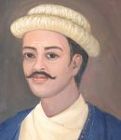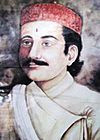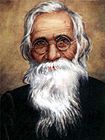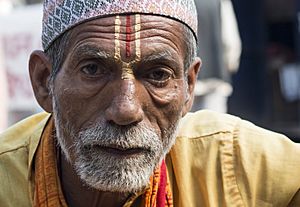Bahun facts for kids
|
Top: Ranganath Paudyal · Bhanubhakta Acharya · Lekhnath Paudyal
Bottom: BP Koirala · Sugam Pokharel · Manisha Koirala |
|
| Total population | |
|---|---|
| 32 lakhs (12.2% of Nepal), as per Nepal Census 2011 | |
| Regions with significant populations | |
| Languages | |
| Nepali language (Khas Kura) as mother tongue | |
| Religion | |
| Hinduism (99% approx.) with ancestral deity worship | |
| Related ethnic groups | |
| Brahmin, Khas, Garhwali, Kshetri, Thakuri |
The Bahun people, also known as Khas Brahmin (Nepali: बाहुन), are an important group in Nepal. They belong to the Brahmin caste, which is a traditional social class. Bahuns are part of the Khas group, who speak Nepali. This group is part of the larger Indo-Aryan family of people.
Bahuns are often called Parvate or Pahari Brahmins. This means they are Brahmins from the hilly regions of Nepal. Traditionally, Bahuns had special roles in society. They often worked as priests, teachers, and astrologers. They also played a big part in government and politics.
In 1854, Nepal created a special law called the Muluki Ain. This law recognized Bahuns as "sacred thread bearers." This means they were seen as important Hindus who followed special religious traditions.
Who are the Bahun people?
The Bahun people are a major ethnic group in Nepal. They make up about 12.2% of Nepal's population. This means there are around 3.2 million Bahuns in the country. Most Bahuns live in Nepal, but some also live in other parts of South Asia.
Their main language is Nepali, which is also called Khas Kura. This language is their mother tongue. Almost all Bahuns (about 99%) follow Hinduism. They also worship their family's traditional gods and ancestors.
Traditional Roles and Life
Historically, Bahuns were respected for their knowledge. They were often the ones who taught others and performed religious ceremonies. They helped people understand their religion and traditions. This made them very important in their communities.
Because of their education, many Bahuns also worked in government. They held positions in administration and politics. This allowed them to help lead the country. Even today, many Bahuns work in different fields, including education, medicine, and business.
Images for kids
 | William M. Jackson |
 | Juan E. Gilbert |
 | Neil deGrasse Tyson |









